|
|
|
Sort Order |
|
|
|
Items / Page
|
|
|
|
|
|
|
| Srl | Item |
| 1 |
ID:
179041


|
|
|
|
|
| Summary/Abstract |
Recent works on ‘uneven and combined development’ (UCD) have focused on its contributions to the study of political economy and geopolitics, but they have yet to systematically address the cultural dimension of social change — the socially shared ideas by which people understand and act upon the world. The present article addresses this lacuna by applying the premises of UCD to the nineteenth-century emergence of Occidentalism: the idea of ‘the West’ as the dominant site of culture, civilisation and modernity. Against the problems of methodological internalism and Eurocentrism, I argue that the categories of unevenness and combined development provide critical entry points for an examination of the international construction of ‘Western’ identities and discourses during the late-nineteenth century imperial era. Specifically, I advance a theory of geocultural feedback which locates the constituting terms of those identities and discourses in a specific conjuncture of global unevenness: how the experience of ‘relative backwardness’ in late-industrialising societies translated into self-consciously ‘Westernising’ projects of catch-up development which destabilised prevailing conceptions of white European supremacy. In both the British and American empires, this historical dynamic produced a distinct pattern of cultural transformation: a reactive discourse of civilisational closure centred on the defence of ‘the West.’
|
|
|
|
|
|
|
|
|
|
|
|
|
|
|
|
| 2 |
ID:
179040


|
|
|
|
|
| Summary/Abstract |
Contemporary extensions of Leon Trotsky’s argument have seen the introduction of uneven and combined development (UCD) into the field of International Relations (IR) as a theory that is uniquely able to unite sociological and international processes. Yet, despite UCD’s historical materialist foundation, its contemporary applications have been largely abstracted from ecological issues. This presents the theory with a problem that it needs to overcome if it wishes to retain explanatory relevance in a future of ecological uncertainty and crisis. This paper argues that UCD’s historical materialist basis includes a distinctly ecological dimension, which—if recovered—may enable the theory to make sense of contemporary environmental problems and also provide IR with an approach that unites international, sociological and ecological factors. The argument proceeds in three steps. It begins with an overview of UCD and its contemporary omission of ecological processes. To recover the theory’s deep ecology, it then foregrounds the ecological dimension of Karl Marx’s historical materialism, showing how an eco-socialist analysis reveals the capitalist nature of the ecological crisis. Finally, it demonstrates that an enhanced version of UCD—re-grounded in this “ecologized” historical materialism—is uniquely able to integrate the international into a Marxist socio-natural reading of the global ecological crisis.
|
|
|
|
|
|
|
|
|
|
|
|
|
|
|
|
| 3 |
ID:
179046


|
|
|
|
|
| Summary/Abstract |
The Socio-Technical Imaginaries (STI) approach in Science and Technology Studies (STS) has illuminated the central role of social imaginaries in shaping the politics of technology. Its emphasis on the multilinear forms of socio-technical development is a useful corrective to universalist explanations of technological change. However, STI lacks a clear account of how inter-societal interaction shapes the imaginaries of any given political community. Synthesizing STI with the theory of Uneven and Combined Development (UCD) can correct this shortcoming. UCD offers an ontology of universals and accompanying methodology of incorporated comparison, enabling STI to integrate inter-societal causality into its theoretical framework. A combined UCD and STI framework is examined in this paper through a focus on imaginaries of technological innovation in contemporary American foreign policy. Responding to the ‘whip of external necessity’, US foreign policy seeks to upend technological diffusion and impose global regulatory evenness on national forms of technological innovation.
|
|
|
|
|
|
|
|
|
|
|
|
|
|
|
|
| 4 |
ID:
179050


|
|
|
|
|
| Summary/Abstract |
This article offers a critique of the attempt by Rosenberg and Boyle to use the theory of uneven and combined development not only to explain the Brexit referendum vote and Trump’s presidential victory in 2016, but also to reinforce their case for recognizing ‘the causality of the international’ in the field of International Political Economy. The critique advanced here deploys a theorization of the internationalization of capitalist states under the aegis of an informal American empire, and points to the salience of state institutional capacities as well as changes in the balance of class forces inside China, the US and UK, to demonstrate that the argument forwarded by Rosenberg and Boyle is diminished by giving insufficient causal weight to class and state forces in the very constitution of the international in the era of global capitalism.
|
|
|
|
|
|
|
|
|
|
|
|
|
|
|
|
| 5 |
ID:
179042


|
|
|
| 6 |
ID:
179045
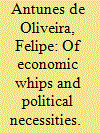

|
|
|
|
|
| Summary/Abstract |
After being recovered and expanded by Justin Rosenberg almost two decades ago, Trotsky’s concept of Uneven and Combined Development (UCD) has inspired many articles, dissertations and books, becoming the core of one of the most exciting contemporary approaches within the cacophonic discipline of International Relations. Nevertheless, the contribution of the emerging UCD literature remains largely unbalanced. Most of it revolves around the classical sociological problems of capitalist transition and state formation. As such, the UCD scholarship disproportionately belongs to the field of international historical sociology, favouring expansive explanations and broad historical questions. With few exceptions, contemporary UCD has had little to say in shorter-term, policy-oriented, International Political Economy (IPE) debates. To fruitfully inform IPE analysis, UCD must expand and refine its highly abstract conceptual toolkit. In this article, I take stock of the existing literature and offer an original contribution to the UCD-IPE framework. Specifically, I unpack the general notion of the ‘whip of external necessity’ into more granular and operational concepts, setting the foundations for a UCD-inspired exchange-rate, monetary and fiscal policy analysis. Finally, the potential of an expanded UCD-IPE framework is illustrated through considerations on the uneven and combined effects of the 2008 financial crisis.
|
|
|
|
|
|
|
|
|
|
|
|
|
|
|
|
| 7 |
ID:
179048
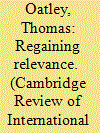

|
|
|
|
|
| Summary/Abstract |
Mainstream American international political economy (IPE) has gradually lost relevance as a framework for understanding developments in the global political economy. It offers little help for understanding the impact of the China Shock, the development and consequences of the Global Financial Crisis, or the anti-system politics that began to emerge in 2016. These are the three developments that largely defined global political economy during the first quarter of the twenty-first century. It is even less helpful for explaining the climate crisis and the energy transition, the issues that will increasingly shape the global political economy for the next quarter century and beyond. Restoring relevance to American IPE will require the development of theoretical frameworks that are intrinsically systemic and dynamic. I suggest that the Uneven and Combined Development, and the Political Economy of Complex Interdependence, perspectives, supplemented by greater attention to system parameters, provide a strong foundation upon which to build such frameworks.
|
|
|
|
|
|
|
|
|
|
|
|
|
|
|
|
| 8 |
ID:
179039
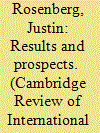

|
|
|
|
|
| Summary/Abstract |
This paper introduces the Special Issue on Uneven and Combined Development (UCD). It begins by briefly outlining the idea of UCD and reviewing its history – from its origins in the writings of Leon Trotsky to its contemporary renaissance in the field of international studies. A second section then introduces the contributions to this Special Issue, showing how they amount to a powerful new wave of UCD studies.
|
|
|
|
|
|
|
|
|
|
|
|
|
|
|
|
| 9 |
ID:
179047
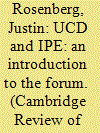

|
|
|
|
|
| Summary/Abstract |
What is the significance of UCD for the field of International Political Economy? In 2019, Justin Rosenberg and Chris Boyle argued that Trotsky’s idea provided an understanding of capitalist world development that helped explain the 2016 Brexit vote and the election of Donald Trump (Rosenberg and Boyle 2019). Situating these events in the longue durée, they interpreted them as outcomes of a unique historical conjuncture of uneven and combined development: neoliberal deregulation in the West had intersected with late-late industrialisation in China; this ‘simultaneity of the non-simultaneous’ multiplied the ‘big country’ effects of China’s industrialisation at a point of maximum openness in the newly deregulated international economy; this produced a major ‘trade shock’ that hastened the decline of manufacturing employment in Britain and the United States, in a geographical pattern that matched the distribution of the Leave and Trump votes.
|
|
|
|
|
|
|
|
|
|
|
|
|
|
|
|
| 10 |
ID:
179044
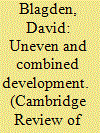

|
|
|
|
|
| Summary/Abstract |
Leon Trotsky’s notion of ‘uneven and combined development’ (UCD) has been gaining traction as an explanatory theory of international relations over the past decade, notably in work by Justin Rosenberg and Alexander Anievas. The idea that the uneven sequencing of economic development between countries affects both their relative power relationships and domestic political stability, in particular, carries prima-facie intuitive plausibility. The potential consequences for international stability of such relative power shifts and domestic upheavals suggest, furthermore, that there may be significant explanatory payoffs from this line of investigation. At the same time, however, the UCD intuition raises other questions about causal foundations and theoretical affiliations. What accounts for the sequencing of uneven development, for example? And how exactly do both relative power shifts and domestic political instability elevate war risks? This paper will address these lacunae, by demonstrating that – at the level of its underlying micro-foundations – UCD can be understood as a compound of catch-up convergence growth theory and security-dilemma realism. Such a recognition paves the way, in turn, for a fruitful application of UCD to contemporary questions in international politics.
|
|
|
|
|
|
|
|
|
|
|
|
|
|
|
|
| 11 |
ID:
179049
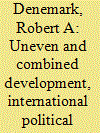

|
|
|
|
|
| Summary/Abstract |
Rosenberg and Boyle's ‘Understanding 2016: China, Brexit and Trump in the history of uneven and combined development’ (2019) is an insightful analysis. It leverages the theory of uneven and combined development (UCD) derived from Trotsky's work on the puzzle of why the proletarian revolution emerged in underdeveloped Russia. The analysis fulfills many of the requirements for reinvigorating IPE set out by dissatisfied senior scholars who lament the narrowing of the study of IPE. But UCD is not unique in this regard. It shares many attributes with world-systems analysis (WSA). I argue that instead of searching for philosophical excuses for ignoring others, we should speak to similarities as well as differences, and seek insights from other perspectives. WSA insights on China, the west, the nature of combination and inequality, and the periphery, are then reviewed. I conclude that scholars of UCD and WSA should be considering one another’s work.
|
|
|
|
|
|
|
|
|
|
|
|
|
|
|
|
| 12 |
ID:
179043
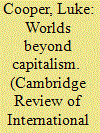

|
|
|
|
|
| Summary/Abstract |
This article explores the implications of uneven and combined development for how system-change is conceptualised. The current moment has featured extensive discussions of how technological transformation is altering the nature of our economy, labour force and environment. Postcapitalists argue that zero cost production undermines the price mechanism in capitalism and opens up new emancipatory possibilities for the construction of the commons. This powerful critique and political vision is let down, however, by a failure to incorporate ‘the international’ dimension into the theory of change. UCD provides a vitally needed correction to this unilinear thinking. To recover an understanding of how societal multiplicity affects the nature of system-change, this article makes the until-recently unusual step of turning to fictional literature. Specifically, it investigates the dynamics of uneven and combined development within the imagined universe brought to life by Kim Stanley Robinson’s science fiction odyssey the Mars trilogy. Despite the events Robinson describes existing wholly in the realm of imagined fantasy, I argue the three books contain five images of uneven and combined development relevant to real world social struggles. Drawing these out can start to develop a normative, political conception of uneven and combined development for the twenty-first century.
|
|
|
|
|
|
|
|
|
|
|
|
|
|
|
|
|
|
|
|
|